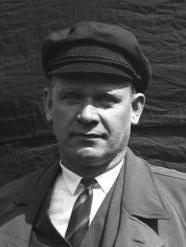Ernst Thälmann
Appearance

Ernst Thälmann or Thaelmann (16 April 1886 – 18 August 1944) was a German politician, the leader of the Communist Party of Germany KPD during much of the Weimar Republic. He was arrested by the Gestapo in 1933 and held in solitary confinement for eleven years, before being shot in Buchenwald on Adolf Hitler's orders in 1944.
| This article about a political figure is a stub. You can help out with Wikiquote by expanding it! |
Quotes
[edit]- There were sometimes in our own ranks comrades who thought themselves cleverer and more capable of judging various questions than was done in the definite decisions of our World Party. Here I stress with the greatest emphasis: our relations with the Comintern, this close, indestructible, firm confidence between the C.P.G. and the C.I. and its Executive—this is one of our Party, the inner-political struggles and disputes in the past and of the higher political maturity of our Party generally.
- Ernst Thälmann in address to the KPD Party on the October Conference, 1932; as cited in: Wilhelm Pieck. "Ernst Thaelmann, Fifty Years Old," The Communist Review, Vol. 3, No. 7, July 1936, pp. 12-17.
Disputed
[edit]- Nach Hitler kommen Wir.
- Translated After Hitler, our turn.
- Ernst Thälmann (1931), cited in: Michelle Goldberg. "After Trump, Our Turn!" at slate.com, March 29, 2016.
- Quote is about Thälmann's refusal to oppose the Nazis in the 1932 German election helped bring them to power. It was quoted by Goldberg (2016) as historical precedent for leftists refusing to oppose Donald Trump as US President.
- The English quote is mentioned in over 30 publications, mostly as a communist slogan around 1930, yet only 4 publications actually attributed the quote to Ernst Thälmann. The original quote is mentioned in numerous publications.
- The phrase was used - after Hitler's appointment as Chancellor on January 30, 1933 - by SPD members Karl Hoeltermann on February 18, 1933 [1] with reference to the idea that the SPD would have to 'clean up the mess' of the Nazis, and Kurt Schumacher prior to the March 5, 1933 election [2] when professing his belief that the SPD would win the elections and replace Hitler.
- Translated After Hitler, our turn.
Quotes about Ernst Thälmann
[edit]- Ernest Thalmann was a devoted revolutionary, a good orator with a fine instinct for the worker's temper, he was an excellent medium for expounding theories and ideas laid down by others. He was a poor thinker, and not given to abstract study, even lacking enough self-discipline to reach the cultural and theoretical level of an average Party member.
- Rose Levine-Meyer, Inside German Communism (1977), as cited in: Ernst Thälmann at spartacus-educational.com, 2017
External links
[edit]- James, C. L. R. (1937). "Chapter 12 – "AFTER HITLER, OUR TURN" – THE INTERNATIONAL PURGED". World Revolution 1917-1936: The Rise and Fall of the Communist International. Somerset, England: Purnell and Sons.

